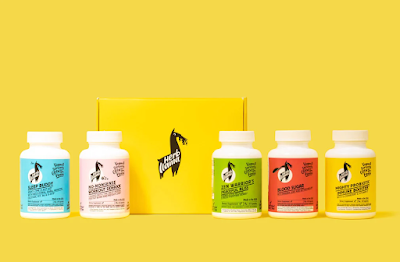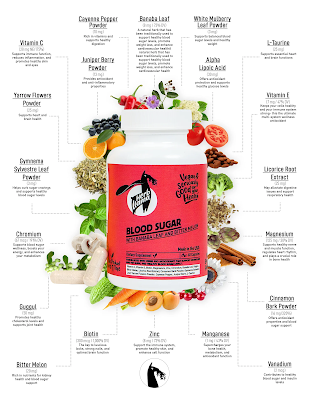How Can Magnesium Ease Anxiety and Restore Balance
Mental
health issues such as anxiety affect millions of people worldwide. While there
are various approaches to managing anxiety, one often overlooked yet highly
effective method is using anxiety supplements. Magnesium is an essential
mineral involved in numerous bodily functions, and its role in alleviating
anxiety and restoring balance is gaining recognition among healthcare
professionals and researchers. In this blog post, we'll explore the fascinating
relationship between magnesium and anxiety, exploring how this mineral can help
ease anxiety symptoms and promote overall well-being.
What is Anxiety?
Anxiety
is a complex mental health condition characterized by excessive worry,
restlessness, and fear. It might present as generalized anxiety disorder, panic
disorder, or social anxiety disorder. Anxiety often involves physiological
symptoms such as an increased heart rate, muscle tension, and trouble
concentrating, which can significantly impact a person's quality of life.
The Connection between Magnesium
and Anxiety
- Neurotransmitter
Regulation: Magnesium
for anxiety is crucial in regulating neurotransmitters, which are
chemical messengers in the brain. One of these neurotransmitters is GABA
(gamma-aminobutyric acid), which has a calming effect on the nervous
system. Magnesium helps activate GABA receptors, promoting relaxation and
reducing anxiety.
- Stress
Response: Chronic
stress and anxiety deplete the body's magnesium levels, creating a vicious
cycle. Magnesium helps modulate the body's stress response by regulating
the release of stress hormones like cortisol, assisting individuals to
manage stress more effectively.
- Muscle
Relaxation: Anxiety
often leads to muscle tension and cramps. Magnesium is essential for
muscle function, and adequate levels can alleviate physical symptoms of
anxiety, such as tight muscles and headaches.
- Sleep
Quality: Poor sleep
is both a symptom and a contributor to anxiety. Anxiety supplements
can improve sleep quality by regulating melatonin production and calming
the nervous system, improving overall mental health.
- Inflammation
Reduction: Chronic
inflammation has been linked to increased anxiety and mood disorders.
Magnesium possesses anti-inflammatory properties, potentially reducing the
inflammatory response that contributes to anxiety.
Types of Anxiety Supplements
Individuals may consider incorporating several natural supplements for anxiety into their daily routines to help manage symptoms. Here are some common types of anxiety supplements:
Magnesium:
- Various
forms are available (e.g., magnesium citrate, glycinate, and threonate).
- Promotes relaxation and reduces muscle tension.
Omega-3
Fatty Acids:
- Found
in fish oil supplements.
- Associated
with improved mood and reduced anxiety and depression symptoms.
- Possess anti-inflammatory properties and support brain health.
L-Theanine:
- An
amino acid is found in tea leaves, mainly green tea.
- It
calms the nervous system and reduces anxiety.
- Often taken with caffeine for a balanced effect.
Ashwagandha:
- An
adaptogenic herb in Ayurvedic medicine.
- Modifies
the stress response and reduces stress and anxiety.
- Available in various forms, like capsules or powders.
Valerian
Root:
- An
herbal supplement with calming properties.
- It
may help with anxiety and sleep disturbances.
- Available as capsules or teas.
GABA
(Gamma-Aminobutyric Acid):
- It's
a neurotransmitter that promotes relaxation.
- Some individuals use GABA supplements for anxiety, but their effectiveness is still being studied.
5-HTP
(5-Hydroxytryptophan):
- A
precursor to serotonin, a mood-regulating neurotransmitter.
- Some
people use 5-HTP supplements for mood support.
- It should be used cautiously and under medical guidance.
Vitamin
D:
- Low
levels are linked to mood disorders, including anxiety.
- Supplements may be helpful for those with deficiencies.
B
Vitamins:
- B6,
B9 (folate), and B12 are involved in neurotransmitter production.
- B-complex supplements may support mood regulation.
CBD
(Cannabidiol):
- A
non-psychoactive compound from cannabis.
- Gaining
popularity for reducing anxiety and stress.
- Available in various forms like oils, capsules, and gummies.
Probiotics:
- Emerging
research links gut health to mental well-being.
- Probiotic supplements support a healthy gut microbiome, potentially influencing mood and anxiety.
Buy Your Anxiety Supplements Now!
Anxiety
is a challenging condition that can significantly impact one's quality of life.
While various treatment options exist, anxiety supplementation and dietary
adjustments offer a natural and effective way to ease anxiety symptoms and
restore balance to the body and mind. Incorporating anxiety supplements into your daily
routine under the guidance of a healthcare professional can be a valuable step
toward better mental health and overall well-being. You can purchase
supplements from Herb Liama, a trusted online store.


Comments
Post a Comment